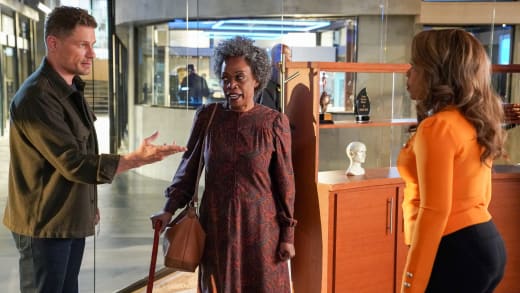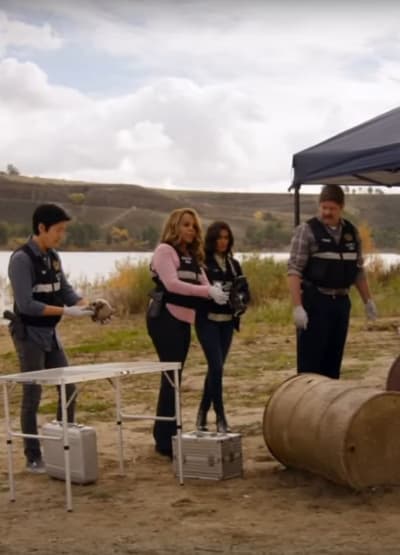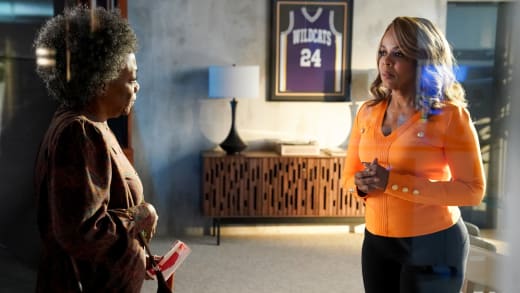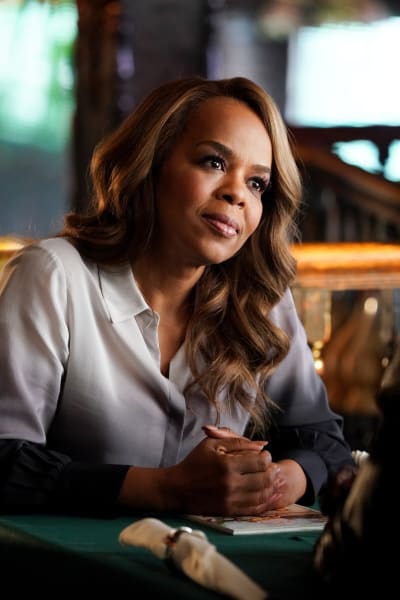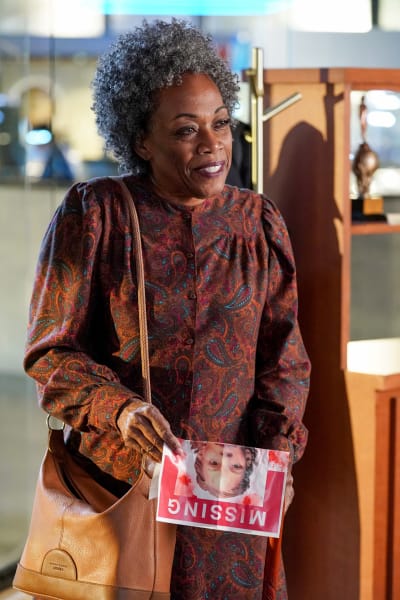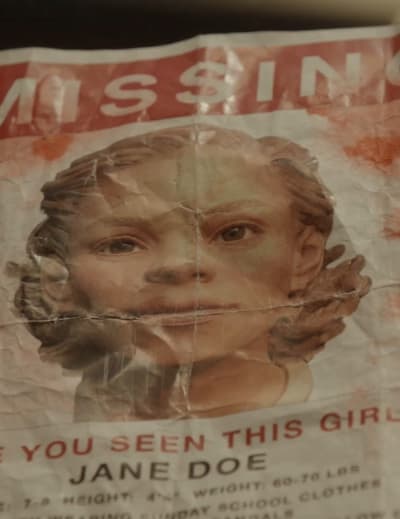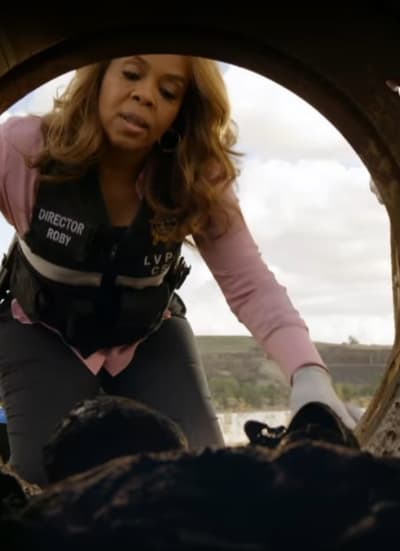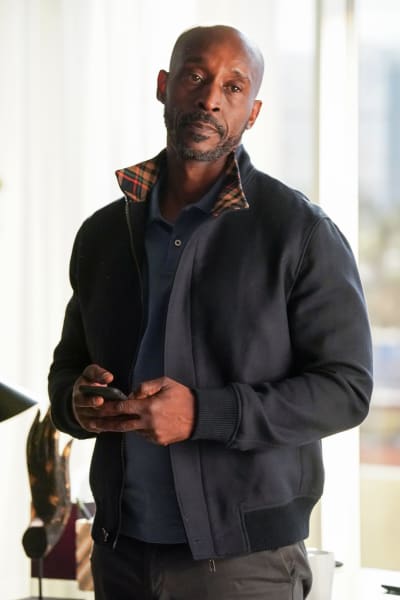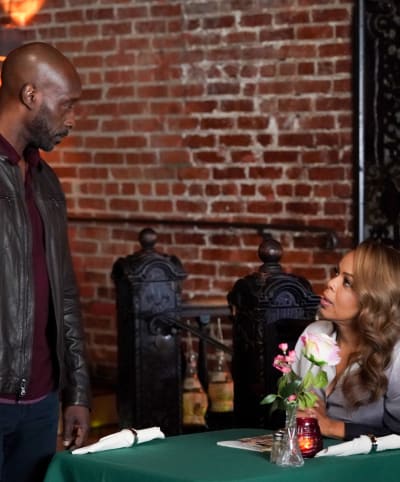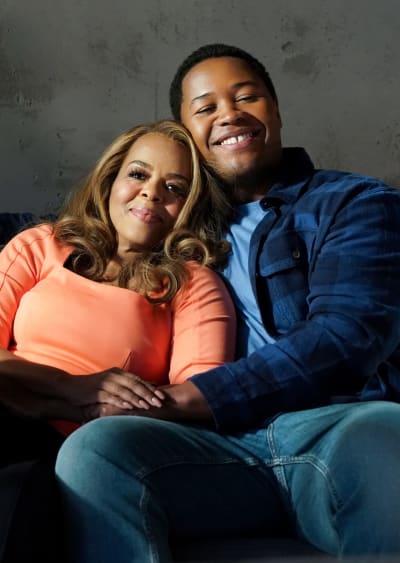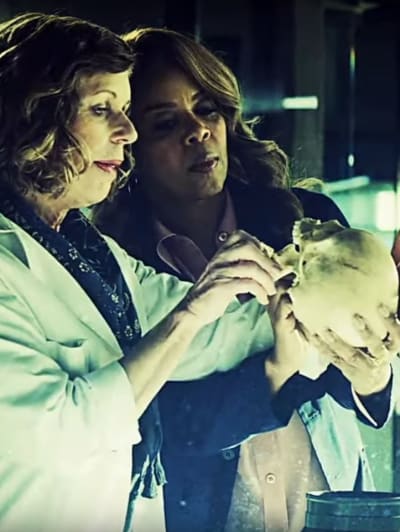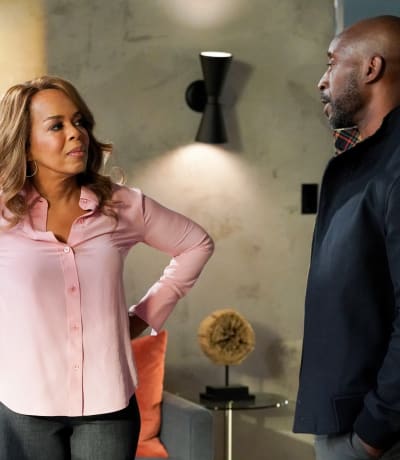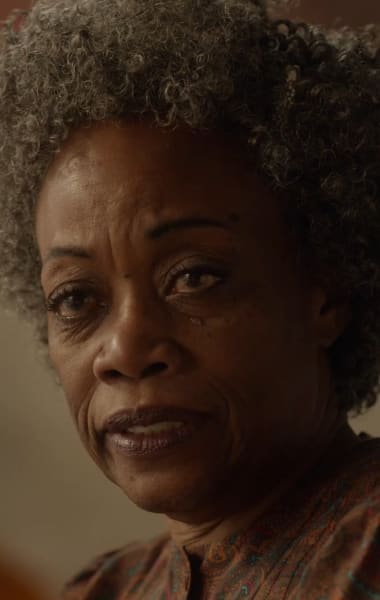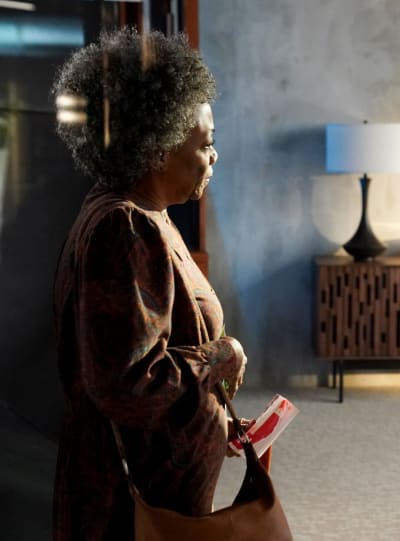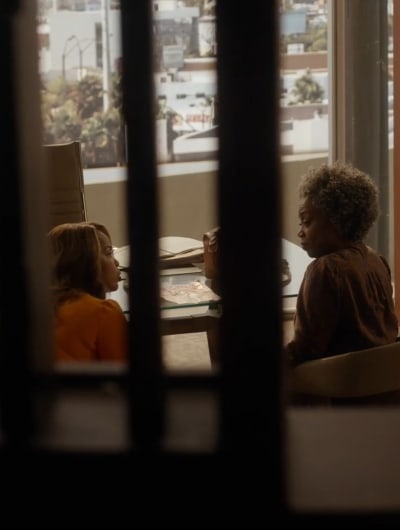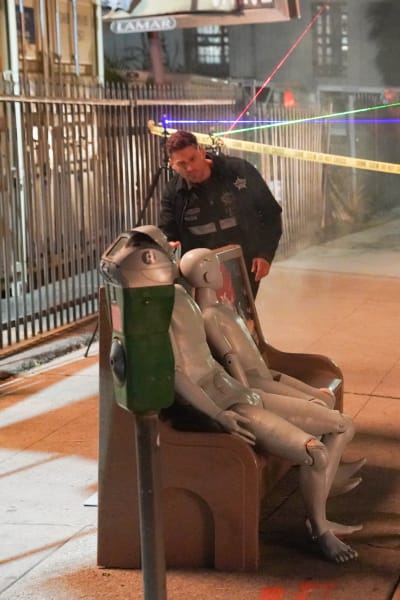Did you cry? CSI: Vegas Season 2 Episode 17 was one the most emotional episodes of the franchise as Max Roby discovers the body of a young girl who was murdered 40 years ago and promises the skeptical mom justice.
TV Fanatic had the pleasure of talking to CSI Franchise creator Anthony Zuiker, actress Paula Newsome, and guest-star Regina Taylor about the emotional moments of this Emmy-worthy episode and the deleted scenes.
I had so much fun chatting with the three of them. Check out the interview below:
So, Anthony, what inspired you to write this episode featuring both of these talented women?
Anthony: Well, once upon a time this season, I wrote a show called Koala that you wrote about earlier. Then Paula Newsome pulled me aside and said I want my Koala.
I went to Austin, Texas, for five days, watched Karen Taylor’s’ masterclass on facial reconstruction, and brought that tactical science back to the show.
I talked with Paula over breakfast and decided to take the impetus of the barrels found in Lake Mead that contain alleged victims from the mob era and spin it and tell a very emotional story. That’s where Regina’s character came in. We told a beautiful story called “The Promise.”
Yes. It was one of my favorite episodes of this season. I cried a lot during it.
Anthony: Thank you. I also cried a lot while writing, watching, producing, and cutting it. I like to write solo episodes. I want to write very character-driven episodes. I always joke with Paula that II may be writing for CSI: Vegas, but ultimately, I’m writing a CSI.
This got back to the roots of great granular and tactical science and kept it simple and beautiful to show the art of how you take a skull with depth markers in clay and be able to facially reconstruct a face and solve a crime.
I’ve also heard this episode has lots of Emmy buzz surrounding it. While I love the entire episode, which scenes got the most attention?
Paula: I could tell you about the one that impacts me the most, Laura, and that’s the one where me and Regina are sitting in the office, and she’s telling the story of what happened, and you see this lone tear falls down her face.
We later discovered that it was the mother’s face when we found this skeleton was her daughter. She was filled with anger at the experience. That impacted me.
Regina: I think they work as part of a whole. From the first moment of introduction, not knowing who she was, I tried to find the person in charge and assumed it couldn’t be the black woman standing before me. The introduction through to the release of what the obstacle and the pain were here in that office.
Being met with someone looking back at you and recognizing you. I can’t say it was my favorite scene because it worked as a whole with each step of the journey of the relationship between the two of them. I thought it was fascinating.
That scene is the one that made me cry at the beginning too.
Anthony: Laura, this is so much about generational angst. Law enforcement was much different 40 years ago than it is nowadays. You wouldn’t walk into someone who runs the crime lab, a woman, or an African American. That is not something that would happen 40 years ago.
Regina’s character brings this angst into Paula’s character and holds her accountable for what happened 40 years ago. Max must step up and prove it’s a new sheriff in town. It’s a new regime.
There’s new leadership, new forensics technology, and she’s to gain this woman’s trust and come back in mother to mother to solve it. That’s the reason why this is so emotional in these times.
Were you expecting it to get Emmy Buzz, Anthony?
Anthony: Yes. I always thought this episode was a powerful vehicle for Paula Newsome to show her emotions best. I haven’t seen a supporting actress performance like this from anybody in broadcast since I’ve been in the business for 25 years.
Regina Taylor’s’ performance is right up there with Brennan Frazier in the Whale and Michelle Yeoh. It is a performance we don’t see on broadcast and should be recognized.
Regina: I’ve admired Paula for a long time in all of her roles. I’m so happy that she’s getting recognized. I love seeing her on the show every week. Working with her, playing with her, and creating with her was a great pleasure.
Regina, this was an important story since cases were handled differently 40 years ago. Why was it important to you to play this character?
Regina: I was moved by the script immediately. I read it, and I started crying. Anthony did a beautiful job creating this character and the storyline. It is a story about loss, regaining faith, and hope when you’ve lost all hope.
This African American woman has lost her child and doesn’t think that the system gives a damn, and she goes in full of rage and heartbreak that someone is even offering to make an effort at this point.
Then she was seen by Maxine, Paula’s’ character, and she wants to join her in this quest to find her child, which gave her hope after all these years. So, by the end of it, it’s a beautiful arc for Raquel.
It was, indeed.
Regina: For Maxine as well. Seeing how these two women collide and join. I think they do love each other. In the end, Raquel is grateful and feels that she can release this heartbreak, these doubts, and fears into the hands of Maxine. So, she passes in that state.
Then, we see that Maxine’s’ tribe supports her as she is fully invested, as she’s going through some shifts in her life, and indeed a change in terms of getting to know this case in Raquel. But her tribe has her back. I thought it was very moving.
Paula, this case seemed very personal to Max. Why do you think it affected her so much?
Paula: I could tell you why it affected Paula, the actress. When I saw Koala, Anthony’s’ ability to write CSI was brilliant. It just expands. When they offered me this role, I knew for a long time that bringing back the faces of people we hadn’t seen was essential.
When I told Anthony I wanted him to write me a Koala, he pitched this storyline and thought it sounded great. Why don’t we get Regina Taylor?
Back in 2008, I was at a fundraiser, and I saw Regina across the room, and it was like a little kid seeing Santa Claus. And I was like, oh my God, that’s Regina Taylor. I had never seen her work. I just knew of her work.
I had seen pictures I had seen, but sometimes, you know, somebody’s good at they what they do. She came up to me and looked at me with awe and reverence. I was loud. I think I scared her because she was shy.
I don’t know how I got her number, but I got her number. And when this opportunity came up, I was like, let’s call her.
Regina: It was terrific. I thought we had such great chemistry. I have admired her work for a long time. So, it was a great opportunity, and I was so happy when she called me and said she wanted me to be on her show.
Anthony: Don’t forget, Laura, Paula left the breakfast, called her, got her on the phone, and I’m like, when you get her on the phone, make sure you tell her we’re shooting this over Thanksgiving before she goes somewhere.
But Paula’s not telling you, Laura, that she wanted a husband too, and she wanted Rob Morgan.
Paula: Having Regina there felt like home, which was essential to me and my character, Max. It was important to Max because looking at the face of a woman who could be her mom, who is atrophied with the pain of losing her daughter. It made Max want to do anything to fix this.
Anthony: By the way, Laura, we did an excellent job punishing Max the entire episode. In terms of the husband, that ended. It’s’ setback after setback. You feel for Max in the episode and the prophetic words of her husband that you can’t put Humpty Dumpty back together again.
Metaphorically, he’s wrong because Max was able to put these two people back together again, have them join the higher power up there, and be buried together. Then, the family comes at the end of the funeral to support Max and all her emotional efforts.
Having top-notch talent come in and do the words is a pleasure. Like I told Jason Tracy, I’ve only gotten it right a couple of times. We probably wrote 841 episodes. Laura, we got it right seven times, from frame one to the last frame, and I think we called “The Promise,” right.
Will we see Max’s family more since her ex has been around supporting her? Are they done, or is he going to stick around more?
Anthony: That’s’ a question for Jason Tracey.
I liked him, and I enjoyed seeing Brian around more. I hope he sticks around more.
Paula: Luke Tennie is a fantastic actor, and Rob, oh my God. Just to be able to make these phone calls and ask these people to, to, to pop in, you know, is fabulous.
Regina, do you think Raquel knew she would die when she had the bullet removed?
Regina: She felt well for the first time in a long time that she was covered. No matter how this goes, I’m surrounded by this extraordinary being that has entered my life.
That makes sense because the episode spoke of a mother’s love.
Regina: Yes. We understand that deep abiding love that will not quit. She fought to the end, and she kept fighting. There was a period of giving up hope that someone else would fight and stand with her, but in the end, she found that person.
Do you think that Raquel and Phoebe were appropriately honored at the end of the funeral? I liked that.
Anthony: I think so. Karen T. Taylor specialized in facial reconstruction and wrote the book. She perfected the discipline, and she’s never had a situation where she’s had to facially reconstruct a bust and bury it.
When she read the script, she was in emotional shambles because that wasn’t something that she’s ever done in her career. She’s done thousands of bodies in facial reconstructions throughout her 50-year career.
This was a new thing for her. She had to do seven versions of this Phoebe head during the shoot, which took months. So, it was very meticulous, very hands-on work.
There’s no computer work. Paula knows we’ve purposely avoided any computer regeneration in the episode to ensure we order the tactical nature of what human hands can do. It’s a very personal discipline.
I had many conversations with dear friends in the African-American community about this Regina character of Raquel. One thing that was across the board was she had closure. She’ll probably pass before Max gets to her and gives her the good news.
So that’s why we chose to have her pass before Paula can get to her, which makes it extra emotional. Then Max buries Mrs. Williams and Phoebe in a more miniature casket and adult size casket at the same time. It is the best emotional ending and victory lap for Maxine.
Paula: Laura, when did you find yourself most impacted when you watched it?
Both the scene where Raquel and Max first met and then at the end when there were the parallel scenes with Brian helping to fix the sculpture of Phoebe and then the flashbacks of Raquel and Phoebe. It shows the power of a mother’s love.
Paula: Beautiful. That’s Anthony. What’s impressive to me about Anthony is finding emotion in science. It’s not on the science, but the storytelling of the science and how the science attaches to emotion and then tells the story. And that’s how it feels to me.
Regina: Telling it made me cry from reading it by myself and then meeting with Paula and Anthony to read it together. I cried all through it and loved every minute of it. It’s such a great group altogether. Paula is fantastic and generous, and Anthony’s brilliant and passionate.
Anthony: Laura, I mentioned before my mom died in 2018, and I’m’ still grieving her. You take all that pain and emotion and put it inside a script. That’s why I chose to have Maxine return, and the bed’s empty. Where’s’ Ms. Williams? Then she looks, and she’s already gone.
We’re never prepared for the death of a loved one. It blindsides us. Every time I sit down to write a CSI, I take what happened to me personally and disguise it into characters in the story. The emotion plays that way because it’s my pain that I’m putting on the page for the audience.
Returning to the old CSIs, we did many of those episodes very well, where it had a tremendous emotional undercurrent with science, good mysteries, great acting, and writing.
But the emotionality of the early CSI that I was trained on with the showrunners, Carol Mendelson and Anne Donahue, um, I come from that school cut from that cloth. I found this episode to be one of the best experiences of my career.
Paula: How did you find that writing this one was different from writing the ones back then?
Anthony: It just emotionally struck me. Once Paula and I talked, it emotionally struck me this would be a mother-daughter episode. I don’t have daughters. I have sons. I can’t explain where it came from. I called Jason Tracy in tears in July and said I must write this.
Paula: I was like, Anthony, no, she can’t be that angry. No, no, it’s not okay. I was very much against it. I talked to Regina, and Regina was like atrophy trauma. It makes absolute sense the saying of it. It gives her a place to go. You are very right about that.
Anthony: She had to come in guns a blazing after 40 years of stewing. She had to be offended that the complexion was off. It’s everywhere. It’s on every billboard, every grocery store, every church has this flyer of this picture that doesn’t look like whom she loved for 40 years.
If I started the character in that place, I had someplace to go. Regina’s very accomplished and has won far more awards than I ever have. You think about where we start and where we end. There’s a beautiful journey where they’re almost at odds with each other weirdly.
There’s’ that particular moment when Maxine stands up to her and says not on my watch, and my watch doesn’t’ need winding. She stands up to her and says, this is not the same old regime. This is me now, and you have to trust in me now.
That’s a lot of talk, but she has to earn her way through the show, and she certainly does. What you didn’t see, Laura, because we cut it based on time. There was a scene where they were in the operating room before she went in, and Max said, you were so mean to me.
Paula: It was so fun to go back and forth.
Anthony: It was the most comic relief moment, and so pure right there.
Then Regina says, get these damn doctors in here. Let’s get this show on the road. And that’s how the scene ends. We cut that, unfortunately.
Paula: We lost a bit too in that scene because the climate to that scene was, I promise, where we were touching one another. That happened because Regina and I felt comfortable in their bodies and with one another. A lot of that was lost because of time too.
Anthony: When Maxine comes in and checks on her, she drops the bullet in her hand, and you see these two African American hands clap each other and take that bullet exchange, and then she takes the mask off and says, get that man. That touch is so poignant. That touch means everything.
Yes. That one was one of my favorites. I knew Max would find him.
Anthony: Laura, we are not Emmy darlings at CSI, even after 25 years in 8,041 episodes. We’re not known for our performances that move the needle in the awards category. But, these performances between Regina Taylor and Paula Newsome must be recognized.
Although the show is not one of these awards, these performances must be recognized.
Absolutely. I was in tears during this episode. It was so good.
CSI: Vegas airs at 10/9c on Thursdays on CBS. To catch up on “The Promise” or any episodes, watch CSI: Vegas online via TV Fanatic.
Laura Nowak is a staff writer for TV Fanatic. Follow her on Twitter.
